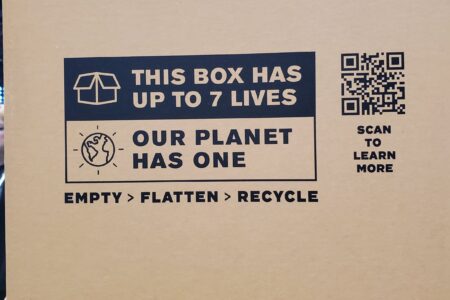FMCG brands shift to sustainable packaging to avoid reputational and financial risk

Image: XtravaganT/Adobe
Increasing the volume of sustainable packaging such as paper is the number one priority for improving the environmental performance of UK FMCG (Fast Moving Consumer Goods) businesses – to avoid reputational and financial risk – according to a new study. The FMCG sector is a significant contributor to countries’ economies. However, it is also one of the biggest creators of plastic waste, particularly in packaging. Many companies in the FMCG sector have embraced sustainable packaging, and global brands have committed to pledges on targets to reduce conventional packaging and introduce more sustainable materials. However, many have yet to do so at scale and make the complete shift from conventional plastic to more sustainable packaging. A new study from Birmingham, England-based Aquapak Polymers explores the future of flexible packaging in the sector, the materials likely to prevail, the timeframes for doing so and the perceived barriers which must be overcome.
The study, FMCG flexible packaging: accelerating the move from plastic to paper, based on research conducted by PureProfile this past March with 100 UK packaging experts responsible for packaging R&D, technology, design and sustainability for FMCG brands reveals that the majority (92%) plan to stop using plastic in their consumer packaging altogether. The report, which launched at the Rethinking Materials Innovation and Investment Summit in London earlier this year, shows that paper and paperboard are the replacement materials of choice, followed by new polymers, bioplastics, and multi-materials.
According to the research, the shift to paper packaging comes ahead of improving the energy efficiency of operations, biodiversity and reducing the carbon footprint of logistics and reducing water use and waste. Reducing or abolishing plastic use altogether ranked last.
Most respondents said that there is a significant threat to their business if the environmental performance of the packaging used is not improved, with two thirds describing it as high and 31% said it was ‘average’. About 3% said the threat was low. Nearly three quarters (70%) of respondents said that their business faced the risk of reputational damage if they did not improve the environmental performance of their packaging, 67% said they could miss ESG and sustainability targets, and 60% said they would see a drop in market share to competitors.
The research highlighted the risks FMCG brands businesses face if they do not move away from plastic to sustainable materials in their consumer packaging, ranked in order of importance:
| Risk | % of respondents |
| Reputational risk | 70 |
| Missing ESG /sustainability targets | 67 |
| Drop in market share to competitors | 60 |
| Pressure from NGOs | 37 |
| Declining share price | 33 |
| Declining sales | 33 |
The majority (87%) of respondents want the switch to alternative materials to replace conventional plastics to take place faster. However, despite the commitment to move away from plastic, the timeframe for transition is still considerable, with 27% of packaging experts expecting this to happen by 2027, 35% by 2028 and 28% by 2029. Just under one third (30%) described the move to new packaging materials in their business as too slow, 58% labelled it as ‘moderate’ and only 11% said it was fast.
The study finds that currently, the main barriers to using more environmentally friendly options are the higher cost of alternative packaging, which was cited by 53% of respondents, the availability of alternative materials (50%) and ensuring the functionality and product protection remains the same (46%).
When asked what key drivers would help the FMCG sector speed up new material development and implementation, the research showed that 70% of respondents believed that more ambitious recycling targets were key, 62% wanted to see increased investment in new materials, and 54% said greater collaboration to accelerate R&D was needed. Half said that an industry-wide commitment to move away from conventional plastic was necessary, while a further 47% cited tighter environmental regulation through taxation of materials with poor environmental performance was important.
Commenting on the results, Dr John Williams, chief technical officer at Aquapak, said, “It is really encouraging to see that moving to sustainable packaging materials such as paper is the top priority for FMCG brands and a board-level decision when it comes to improving their environmental credentials and mitigating reputational and financial risks of not doing so. Abolishing the wrong sort of plastic use is important and is a long-term target, the change must be balanced as they assess alternative materials and wait for greater clarity around targets and regulation.”
To download the report, click here.
- Vanessa L Facenda, editor, Tea & Coffee Trade Journal.
Keep in touch via email: [email protected] Twitter: @TCTradeJournal or LinkedIn: Tea & Coffee Trade Journal



